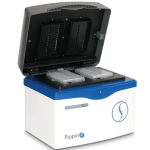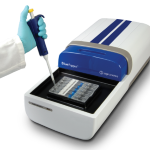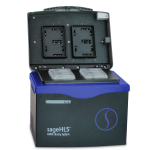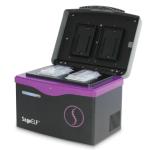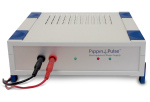March 2023
Authors:
Veronika Mikhaylova, Madison Rzepka, Tetsuya Kawamura1, Yu Xia, Peter L. Chang, Shiguo Zhou, Long Pham, Naisarg Modi, Likun Yao, Adrian Perez-Agustin, Sara Pagans, T. Christian Boles , Ming Lei, Yong Wang, Ivan Garcia-Bassets, and Zhoutao Chen
Abstract:
“In the human genome, heterozygous sites are genomic positions with different alleles inherited from each parent. On average, there is a heterozygous site every 1-2 kilobases (kb). Resolving whether two alleles neighboring heterozygous positions are physically linked—that is, phased—is possible with a short-read sequencer if the sequencing library captures long-range information. TELL-Seq is a library preparation method based on millions of barcoded micro-sized beads that enables instrument-free phasing of a whole human genome in a single PCR tube. TELL-Seq incorporates a unique molecular identifier (barcode) to the short reads generated from the same high-molecular-weight (HMW) DNA fragment (known as ‘linkedreads’). However, genome-scale TELL-Seq is not cost-effective for applications focusing on a single locus or a few loci. Here, we present an optimized TELL-Seq protocol that enables the cost-effective phasing of enriched loci (targets) of varying sizes, purity levels, and heterozygosity. Targeted TELL-Seq maximizes linked-read efficiency and library yield while minimizing input requirements, fragment collisions on microbeads, and sequencing burden. To validate the targeted protocol, we phased seven 180-200 kb loci enriched by CRISPR/Cas9-mediated excision coupled with pulse-field electrophoresis, four 20 kb loci enriched by CRISPR/Cas9-mediated protection from exonuclease digestion, and six 2-13 kb loci amplified by PCR. The selected targets have clinical and research relevance (BRCA1, BRCA2, MLH1, MSH2, MSH6, APC, PMS2, SCN5A-SCN10A, and PKI3CA). These analyses reveal that targeted TELL-Seq provides a reliable way of phasing allelic variants within targets (2-200 kb in length) with the low cost and high accuracy of short-read sequencing. Lynch syndrome (LS), caused by heterozygous pathogenic variants affecting one of the mismatch repair (MMR) genes (MSH2, MLH1, MSH6, PMS2), confers moderate to high risks for colorectal, endometrial, and other cancers. We describe a four-generation, 13-branched pedigree in which multiple LS branches carry the MSH2 pathogenic variant c.2006G>T (p.Gly669Val), one branch has this and an additional novel MSH6 variant c.3936_4001+8dup (intronic), and other non-LS branches carry variants within other cancer-relevant genes (NBN, MC1R, PTPRJ). Both MSH2 c.2006G>T and MSH6 c.3936_4001+8dup caused aberrant RNA splicing in carriers, including out-of-frame exon-skipping, providing functional evidence of their pathogenicity. MSH2 and MSH6 are co-located on Chr2p21, but the two variants segregated independently (mapped in trans) within the digenic branch, with carriers of either or both variants. Thus, MSH2 c.2006G>T and MSH6 c.3936_4001+8dup independently confer LS with differing cancer risks among family members in the same branch. Carriers of both variants have near 100% risk of transmitting either one to offspring. Nevertheless, a female carrier of both variants did not transmit either to one son, due to a germline recombination within the intervening region. Genetic diagnosis, risk stratification, and counseling for cancer and inheritance were highly individualized in this family. The finding of multiple cancer-associated variants in this pedigree illustrates a need to consider offering multicancer gene panel testing, as opposed to targeted cascade testing, as additional cancer variants may be uncovered in relatives.”
Sage Science Products:
The HLS-CATCH process (SageHLS system) was used to purify the larger (180-200kb) targets.
Author Affiliations:
Universal Sequencing Technology Corp., Carlsbad, CA
Sage Science Inc., Beverly, MA
Department of Medicine, University of California, San Diego, La Jolla, CA
Department of Medical Sciences, School of Medicine, University of Girona, Girona, Spain
Universal Sequencing Technology Corp., Canton, MA
BioRxiv preprint
DOI: 10.1101/2023.03.05.531179
